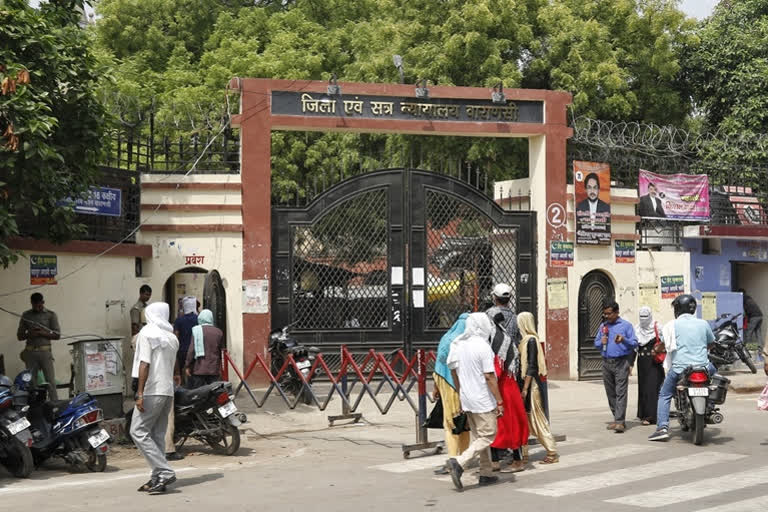Varanasi (UP): The Varanasi district judge has reserved the ruling in the Gyanvapi mosque dispute case. The verdict is expected to come on Tuesday. The Hindu side has sought permission for daily worship of Shringar Gauri in the Gyanvapi complex and also permission for the worship of 'Shivling' found in the ablution area of the mosque. They have also sought the removal of debris in the passage leading to the room under 'Shivling'.
The Muslim side has opposed the sealing of the ablution area and seeks to consider the Gyanvapi survey and case with reference to the Places of Worship Act, 1991. During the proceedings, the maintainability of the Places of Worship Act 1991 was raised by the Muslim side. The bench headed by Varanasi distinct judge Dr A.K. Vishvesha also accepted the copy of the survey report submitted by ousted commissioner Ajay Mishra.
In another important development, the Hindu side has filed an application under 156 (3) CrPC before Chief Judicial Magistrate for registration of FIR under sections 153A(2) and 505 (3) IPC against persons who allegedly performed wuzu (between May 16-19) in the ablution area where 'Shivling' was stated to be found. Notably, the Varanasi civil court, as well as the Supreme Court had ordered the site to be protected, and alternate arrangements were made for wuzu elsewhere.
The Supreme Court bench headed by the bench of Justices DY Chandrachud, Surya Kant, and PS Narasimha on May 20 had ordered the transfer of the Gyanvapi mosque case to the district judge, Varanasi.
While hearing Anjuman Intezamia Masajid Committee's plea against a Varanasi court order, which directed a videography survey of the Gyanvapi Mosque complex close to the famous Kashi Vishwanath Temple, the top court said that a senior and experienced judicial officer of Uttar Pradesh Judicial services will hear the case. The Court also directed the district magistrate to make appropriate arrangements for wuzu at the masjid.
The May 17 interim order for sealing the spot where the Shivling was found, without impeding namaz will continue till the Order 7 Rule 11 application is decided, the court ruled, and asked for alternate arrangements to be made for wuzu.
Also Read: Varanasi court to hear Gyanvapi case today; security beefed up in the city
Meanwhile, BJP member and Supreme Court advocate, Ashwini Upadhyay, who had challenged the Places of Worship(Special Provisions) Act,1991, has filed an application in the top court to become a party to the Gyanvapi mosque dispute case. Upadhyay has contended in his plea that only those places can be protected which are constructed in accordance with the personal laws and not in derogation of the personal law.
"Status of mosques can be given only to such structures which have been constructed according to tenets of Islam and mosques constructed against the provisions contained in Islamic law cannot be termed as a mosque. Muslims cannot assert any right in respect of any piece of land claiming to be a mosque unless it has been constructed on legally owned and occupied virgin land. It is necessary to state that property vested in Diety continues to be the Diety's property irrespective of the fact that any person has taken illegal possession and offered namaz," the plea read.
"Applicant submits that since 1192 to 1947, barbaric invaders damaged and desecrated religious places of Hindus Jains Buddhists Sikhs, depicting Indian cultural from north to south, east to west," plea further states. Mentioning the 1991 Act, Upadhyay has contended that it is against the principle of secularism read with Article 14-15 as the state can not show its inclination or hostility towards any religion be it minority or majority. He says that religious places disputes that are pending or arisen can not be barred.
"Centre neither can take away the power of High Courts and Supreme Court conferred under Article 226 and 32. The impugned Act has barred rights and remedies against encroachment made on religious places of Hindus, Jains, Buddhists and Sikhs. Moreover, the Centre has transgressed its legislative power in barring remedy of judicial review, which is the basic feature of the constitution," read the plea.
The Places of Worship(Special Provisions) Act,1991 seeks to protect the religious character of all structures as it stood on 15th August 1947, i.e on the date of independence. It bars the courts to entertain cases arising out of disputes over religious structures. Ayodhya's Ram Janmabhoomi- Babri masjid dispute was however exempted from the Act and therefore it was decided by the top court in 2019. But the bench led by the then CJI Ranjan Gogoi had clarified that similar cases of disputes can not be entertained with respect to other sites of the Act.
Presently, Justice DY Chandrachud led bench is hearing the Gyanvapi Mosque dispute which had also been a part of the Ayodhya bench. Another judge, Justice PS Narasimha, of the bench, is one of the advocates appearing for Hindu parties in the Ayodhya case.
Also Read: 'Aurangzeb didn't order creation of waqf, Gyanvapi not a mosque': Hindu party in SC



